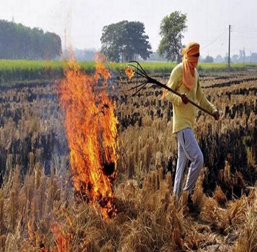Farmers of
Punjab and Haryana have started to burn the stubbles in their fields, to
prepare them for the next crop. The National capital region is once again
distressed about its breath fighting situation, during winters.
- When the parali are burned, dangerous chemicals like carbon monoxide and carbon dioxide are released into the atmosphere, causing severe air pollution resulting in increase in concentration of greenhouse gases and leads to damage of ozone layer.
- It is also harmful to mankind, since it causes a variety of health problems, from skin infections to eye discomfort, and effects soil too by burning and destroy its vital nutrients.
- The National Green Tribunal has banned the act of burning stubble, as is causes extreme air pollution in the surrounding regions.
- In its 2018 decision, the NGT mandated that farmers will be fined with rupees 2500/- and 5000/- for burning parali on 2-5 acres and more than 5 acres respectively.
- Despite of this ban, farmers are still practicing the burning method, as they are practicing it since ages and also for profits.
- The tribunal with the help of court, has also proposed incentives to the farmers who does not burn the parali with CRM (Crop Residue Management) machinery.
- Farmers are requested to approach district admin and seek help for the machinery like “HAPPY SEEDER”, “SUPER SEEDER”, “PADDY STRAW CHOPPER”, “MULCHER” etc., on subsidised rates to prevent stubble burning.
Farmers can also benefit by using these alternatives, to get rid of stubbles:
- Use “PUSA decomposer” which was introduced by The Indian Agricultural Research Institute, that accelerates the decomposition of crop residues, turning them into valuable fertilizers.
- In-situ management of stubbles includes, mixing the stubbles back into the soil. This can add nutrients to the soil.
- while Ex-situ management includes using of these stubbles as a cattle fodder.
- Other management options for stubbles include, grazing with livestock, slashing, mulching or harrowing etc.
- Farmers can also use the stubbles and straw in the production of ethanol.
For more
updates about Agri news and weather forecast, please visit Fasal Salah Android
App.
Download Fasal Salah - https://goo.gl/5Yu1u9

Comments
Post a Comment